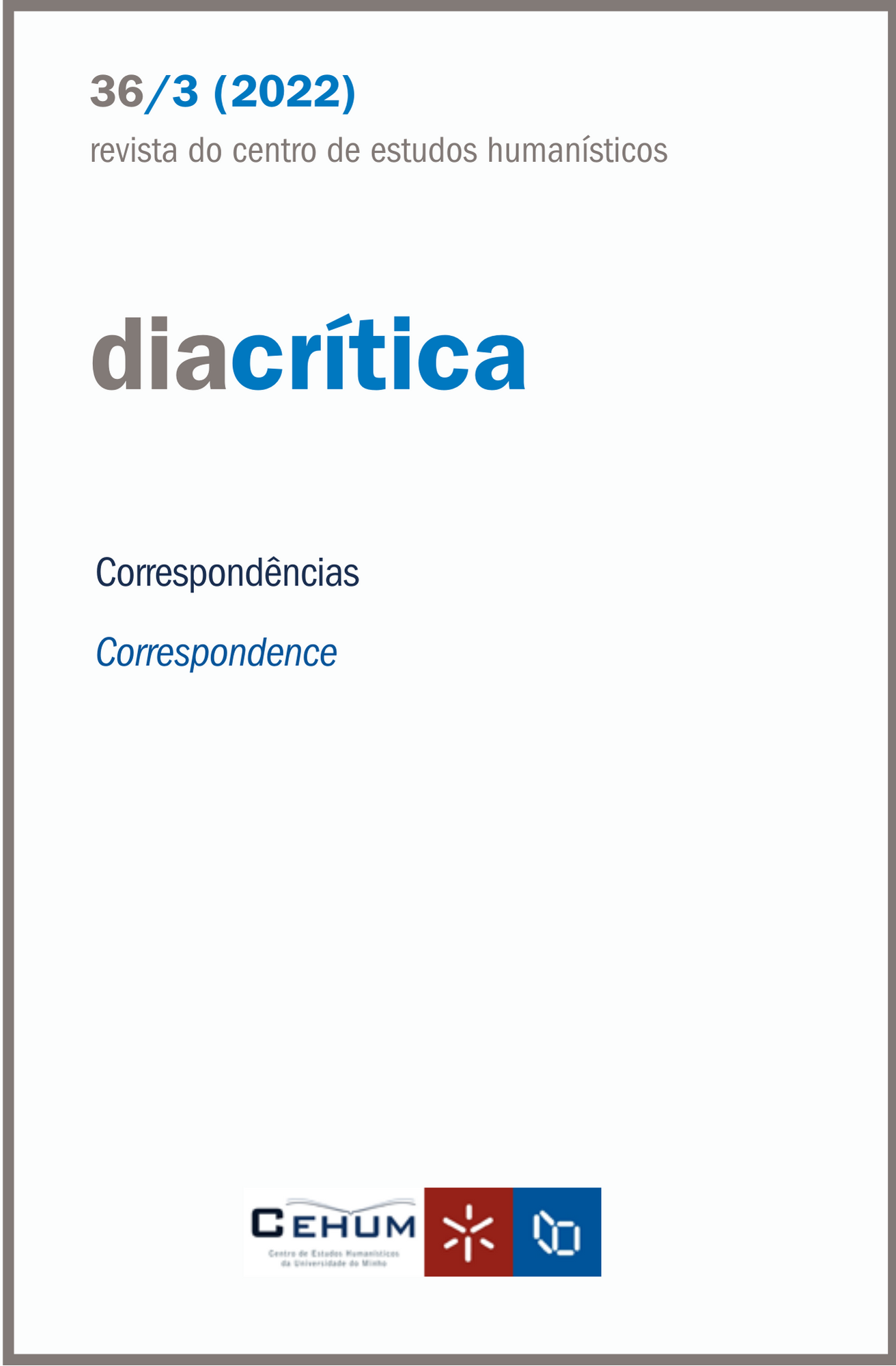Do descontentamento à ação estética: na criação do espetáculo “Eis o Homem”
DOI:
https://doi.org/10.21814/diacritica.5107Palavras-chave:
Teatro, Artes perfomativas, Investigação artística, Transformação, Performance-enquanto-investigaçãoResumo
Este texto aborda algumas das premissas iniciais e desenvolvimentos conceptuais que decorreram do processo de construção e apresentação do espetáculo “Eis o Homem”. Partindo de materiais de reflexão que foram reunidos, construídos e consultados ao longo das principais fases do processo de criação, este texto procura explicitar possibilidades filosóficas, críticas, políticas e epistemológicas inerentes ao trabalho de criação teatral, assim como contribuir para a discussão corrente acerca de formas adequadas de enquadrar estes objetos estéticos sob o ponto de vista da investigação académica.
Referências
Arendt, H. (1989). Origens do Totalitarismo. Companhia das Letras (original publicado em 1949).
Beck, U. & Beck-Gernsheim, E. (2002). Individualization: Institutionalized individualism and its social and political consequences. Sage. DOI: https://doi.org/10.4135/9781446218693
Berger, P. & Luckmann, T. (1966). The social construction of reality: A treatise in the sociology of knowledge. Anchor Books.
Boal, A. (2013). Teatro do Oprimido e outras poéticas políticas. Cosac Naify Letras (original publicado em 1975)
Brecht, B. (1967). Gesammelte Werke in 20 Bänden (Vol. 10; E. Hauptmann, Org.). Suhrkamp.
Brecht, B. (1999). A compra do latão (1939-1955). Vega.
Derrida, J. (2006). Gramatologia. Perspectiva. (original publicado em 1967)
Dewey, J. (1916). Democracy and education: An introduction to the philosophy of education. Macmillan.
Goodman, N. (1968). Languages of Art: an approach to a theory of symbols. Bobbs- Merrill Company.
Goodman, N. (1978). Ways of worldmaking. Hackett publishing company. DOI: https://doi.org/10.5040/9781350928558
Hardoon, D. (2017, jan.). An economy for the 99%. Oxfam Briefing paper, pp. 1–11. https://oi-files-d8-prod.s3.eu-west-2.amazonaws.com/s3fs-public/file_attachments/bp-economy-for-99-percent-160117-summ-en.pdf
Hobbes, T. (2008). Leviathan or the matter, forme and power of a Common Wealth ecclesiastical and civil. Atria Books (original publicado em 1651)
Kershaw, B., & Nicholson, H. (2011). Research methods in theatre and performance. Edinburgh University Press. DOI: https://doi.org/10.1515/9780748646081
Lehmann, H. (1999). Postdramatic theatre. Taylor and Francis.
Lipovetsky, G. (2007). A felicidade paradoxal: Ensaio sobre a sociedade do hiperconsumo. Edições 70.
Mahoney, M. J. & Lyddon, W. J. (1988). Recent developments in cognitive approaches to counseling and psychotherapy. The Counseling Psychologist, 16(2), 190–234. https://doi.org/10.1177/0011000088162001 DOI: https://doi.org/10.1177/0011000088162001
Malzacher, F. (Ed). (2015). Not just a mirror: Looking for the political theatre of today. House on Fire.
Maturana, H. (1997). Emociones y lenguaje en educacion y politica (9.ª edição). Dolmen ediciones s.a.
Mead, G. H. (1934). Mind, self and society. University of Chicago Press.
Mouffe, C. (2019). For a left populism. Verso.
Nelson, R. (2013). Practice as research in the arts. Palgrave Macmillan. DOI: https://doi.org/10.1057/9781137282910
Piketty, T. (2014). Capital in the twenty-first century. Harvard University Press. DOI: https://doi.org/10.4159/9780674369542
Rosling, H. (2018). Factfulness: Ten reasons we’re wrong about the world – and why things are better than you think. Flatiron books.
Silva, J. E., Ferreira P., Coimbra J.L., & Menezes I. (2017). Theatre and psychological development: Assessing socio-cognitive complexity in the domain of theatre. Creativity Research Journal, 29(02), 157–166. https://doi.org/10.1080/10400419.2017.1302778 DOI: https://doi.org/10.1080/10400419.2017.1302778
Silva, J. E. & Rayner, F. (2020). Performing the paradox: Collaboration as intervention in “Eis o Homem”. Studies in Theatre and Performance, 42(2), 123–138. https://doi.org/10.1080/14682761.2020.1780813 DOI: https://doi.org/10.1080/14682761.2020.1780813
Sprinthall, N. A. (1991). Role-talking programs for high-school students: New methods to promote psychological development. In B. P. Campos (Ed.), Psychological intervention and human development (pp. 33–38). ICPFD/Louvain-la-Neuve: Academia.
Stiegler, B. (2010). Projecto revoluções (Manifesto 2010) Ars Industrialis. https://arsindustrialis.org/manifeste-2010
Stiegler, B. (2018). Da miséria simbólica: I. A era hiperindustrial. Orfeu Negro.
Stiegler, B. & Neyrat, F. (2012). Interview: From libidinal economy to the ecology of the spirit. Parrhesia, 14, 9–15.
Downloads
Publicado
Como Citar
Edição
Secção
Licença
Direitos de Autor (c) 2023 José Eduardo Silva

Este trabalho encontra-se publicado com a Creative Commons Atribuição-NãoComercial 4.0.










